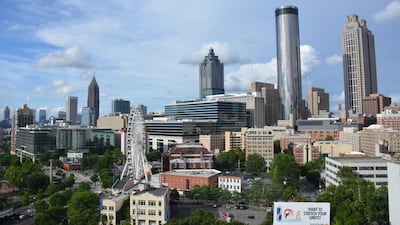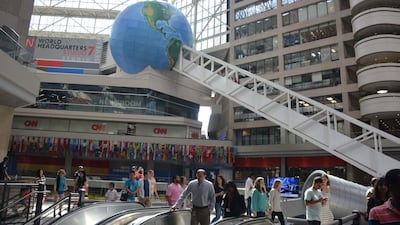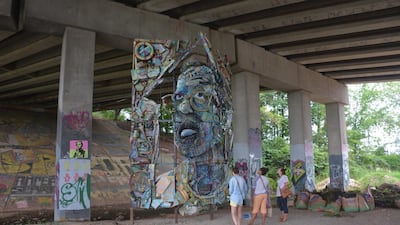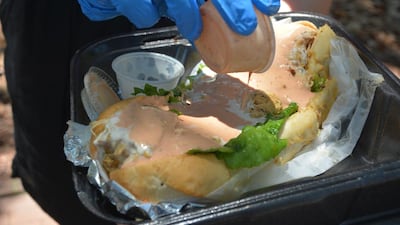“There is no heroism in staying small so that other people don’t feel insecure. Let divine light shine.” I’m in my hotel room on the 27th floor of the Atlanta Marriott Marquis, and the British boxer Chris Eubank is speaking to CNN about the inspiration he took from the life of Mohammed Ali, who has just died. In many ways, Atlanta – which grew up around and was named after a railroad - feels like the centre of everything. Martin Luther King, who spearheaded the civil rights struggle of the 1950s and 60s, was born here, and the city was instrumental in the ending of segregation. CNN’s world headquarters is across the road from my hotel, as is the global HQ of Coca-Cola. The city’s airport, Hartsfield Jackson International Airport, is the world’s busiest by total number of passengers. Even my hotel, a striking, 52-storey, 1980s skyscraper, had the world’s tallest atrium, until the Burj Al Arab opened in 1999. And they have the best steaks I’ve ever had.
Yet at first glance, Atlanta is nothing special. It's known as "the city in the forest" because of the number of trees surrounding it, but its downtown area could be in any city in America. The Centennial Olympic Park is the main tourist area, with four attractions clustered together. The World of Coca-Cola is interesting for the history of the beverage, which was invented in the city as a health drink by a pharmacist called John Pemberton in 1886, before being bought, sold and developed into what is still one of the world's most profitable companies. On the sampling floor, you can try dozens of different Coca-Cola drinks from around the world. With a CNN studio tour, a guide will take you right inside the heart of the surprisingly dated-looking HQ, and give you a rushed but informative back-of-house view. Our guide tells us that a "normal" news story will take eight hours to get from the ideas stage to screen, whereas "breaking news" can be online within five minutes. The huge portraits of CNN's big-name stars, hung in the hallways, give an indication as to the size of their egos – and there are many of Anderson Cooper.
The Georgia Aquarium is the biggest aquarium in the western hemisphere. Though most of the enclosures still seem far too small, the whale shark tank is dramatic, and like being in a giant theatre. Then there's the Center for Civil and Human Rights, which explains why Atlanta was essentially less racist than most other cities in the south; a place of business and education, it has long been known as a city "too busy to hate." Not that it gives an unvarnished view of history; there are hard-hitting documentary films about the violent reaction whites had to non-violent protests such as the Freedom Riders; an interactive "lunch counter" exhibit puts you in the place of the civil rights demonstrators who refused to move from "whites only" restaurants. Placing your hands on the counter, headphones and a vibrating chair communicate the verbal and physical hostility protesters endured, without retaliating. Bottles were broken, they were kicked, jabbed sworn at and had food thrown at them – it's hard to put up with even in a mocked-up setting for more than 30 seconds.
At the Atlanta History Center in Buckhead, 10km north of the downtown area, there's a great Civil War exhibit which, along with the film Gone With the Wind, gives a sense of the South's wider role in earlier history, and how Georgia fitted in with other slave-owning states. Real signs such as "We refuse service to integrationists and interstate travellers" gives a clear sense of how and why many Americans are still distrustful of people from elsewhere - even when that elsewhere is just a few miles down the road.
The city's Atlanta's most interesting areas are close to the downtown area, but could easily be missed by visitors. I take an electric car tour with Steve Chester of ATL Cruzers, and we set out early on a Sunday morning, having the streets virtually to ourselves. Starting out in the Fairlie Poplar historic district and heading east, we pass a statue of Andrew Young, a former mayor of Atlanta and America's first black ambassador to the United Nations. One of his sayings was: "Nothing is illegal if 100 businessmen do it." We then head out onto Auburn Avenue, which defined an area called Sweet Auburn, which is now a protected historic district. "This is where you had all your black businesses, churches, insurance companies, the first black newspaper was here," says Steve, with all the intelligence and dynamism of the people he is describing. We pass the Apex Museum, "Where Every Month is Black History Month", and the birth home of Dr King, whose brave struggle inspired enough people to believe in his paraphrasing of the bible, to fight "until justice flows down like water."
Steve drops me at the Atlanta Beltline, a new pathway for walking, running and cycling, which runs right around the city. The development has spearheaded urban regeneration, with pathside cafes, restaurants, art and markets such as Ponce City Market and Krog Street Market holding their own with anything in London or New York – even better here, I think, as there's fresh air, cheaper prices and an unpretentious atmosphere.
From one of Hertz's downtown locations – there are several – I rent a VW Tiguan for the four-hour drive east to Savannah. I'm out of the city within five minutes, but what should have been an easy ride was made hair-raising by the landing of Tropical Storm Colin in northern Florida and torrential rain on my journey, culminating in my NPR radio broadcast being interrupted by a tornado warning, urging travellers in certain counties to "seek cover underground". I didn't know which counties they were talking about so carried on to Savannah, holding my nerve as lorries thundered past in extremely poor visibility and wondering what to if a tornado appeared ahead. Yet the Tiguan is a sturdy beast, and the "NeverLost" GPS system brought me safely to the Thunderbird Inn, a retro motel on the outskirts of town, without a scratch.
Savannah is America’s largest preserved historic city, designed as 24 squares by James Oglethorpe, an British member of parliament, social reformer, army general and founder of the colony of Georgia in the 1730s. Some 22 of the city’s 24 squares remain, filled with towering oak trees dripping with Spanish moss and huge, red-brick mansions built with the profits from cotton. It’s a fantastical place reflective of its founder’s utopian ideals; initially at least, alcohol, slavery, lawyers and other sins and sinners were banned. It survived being burned down during the Civil War because the city surrendered, because the war was over or because General Sherman took a liking to the place, depending on who you listen to.
I take a 90-minute boat ride on the Savannah River Queen, hearing how many of the waterfront roads and houses were built from the ballast of British ships and how the port is still the fourth-biggest in the US, shipping steel and clay, among other materials. I take a "trolley" tour on an open bus with heavily-accented narration. Next, I go on a "Famous & Secret East Side Food Tour"; I'm with a group and a guide called Lauren from Alabama, who deftly administers the equivalent of a five-course meal with dessert and coffee across six venues in a couple of hours, all the time imparting interesting snippets of history and local information. We taste delicious chicken apple sausages and a beetroot, yoghurt, goat's cheese and walnut dip at a smart deli, macaroni cheese and cabbage stew at Wall's BBQ, tostadas with spicy green tomato relish at a restaurant, a mouthwatering takeaaway chicken sandwich from Zinzi's, a South African place, and mini croissants stuffed with pimiento cheese from a coffee shop.
I take tours of two outstanding preserved houses, Davenport House and the Andrew Low House, before heading out of town to the remains of the Wormsloe Plantation. Driving up the eerie drive, oak trees form a natural tunnel. I park the car and walk to the remains of the house, which is ruined. Wind whistles in the trees and across the swampy cotton fields; justice, it seems, took a while but flowed here eventually. A meal at the Wyld restaurant, which looks out over open water and bright green spartina grass, is memorable for its tranquillity.
It's a pretty two-hour drive north to Charleston, another well-preserved town which feels much more colonial. I stay at the Fulton Lane Inn, a historic hotel dating from 1912; many of the buildings here date from the 1850s and were built with hardwood; their colours and smart style now command high prices – Charleston now has the fifth-highest prices in the country for real estate, according to my guide, Nancy. It's also the second-most popular destination in the US for weddings, yet such gentility sits uncomfortably with the city's past as a centre for the slave trade. In the 1800s, most of the population were slaves, and a staggering 1 in 4 African Americans can trace their lineage back to slaves brought into Charleston. Of some 40 indoor slave markets around the town, just one remains, and has been turned into a museum. Disturbingly, the sign reading "MART" is still hanging in steel above the outside entrance. The inside is filled with matter-of-fact information on the prices of slaves depending on their age and condition, and harrowing photographs of slave ships, which brought people in chains from Africa, stacked on boards on top of one another. In total, some 12 million are thought to have been shipped across the Atlantic to both North and South America.
The Old Slave Mart Museum points to the survival and reproduction of African Americans in North America, their cultural contribution and fight for equal rights as evidence of their eventual triumph over evil. Other reminders are seen in African-American historical walking tours, ghost tours and Gullah customs, such as basket weaving. Down on the waterfront, one such woman is displayhing roses she’s woven from reeds – I like them, but I’ve left my money in the hotel. She picks one out and hands it to me, free.
rbehan@thenational.ae










